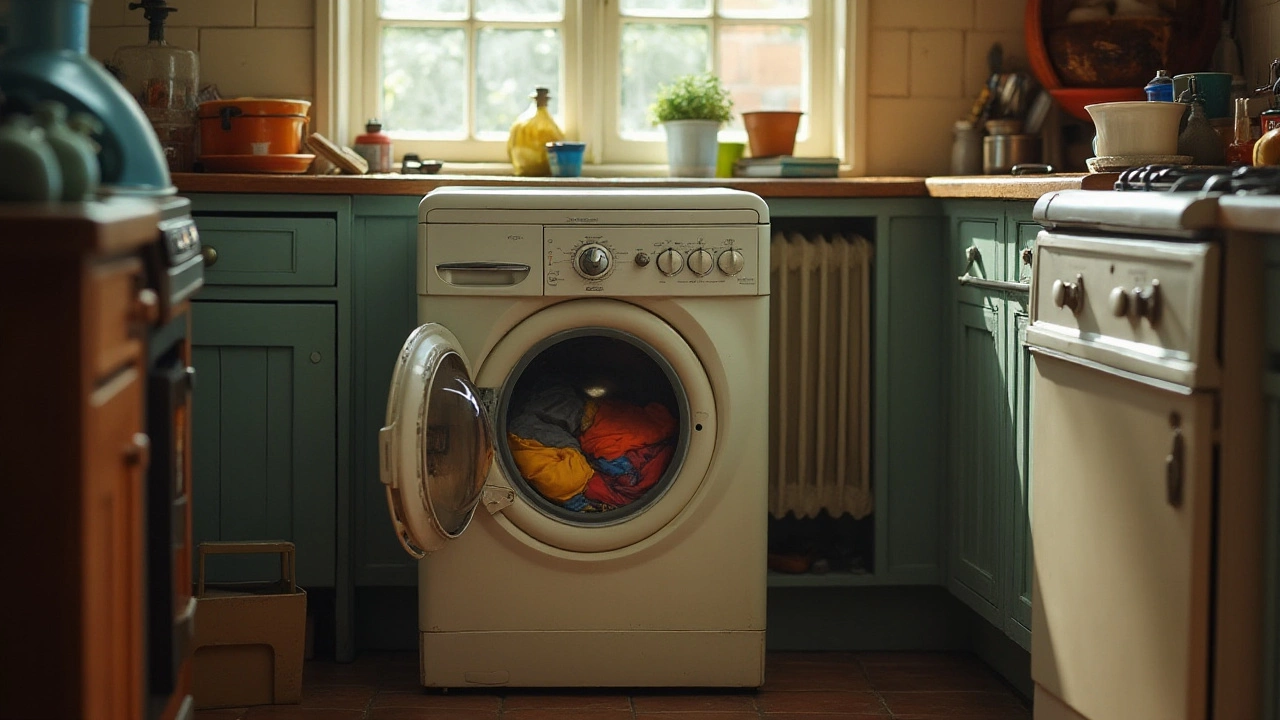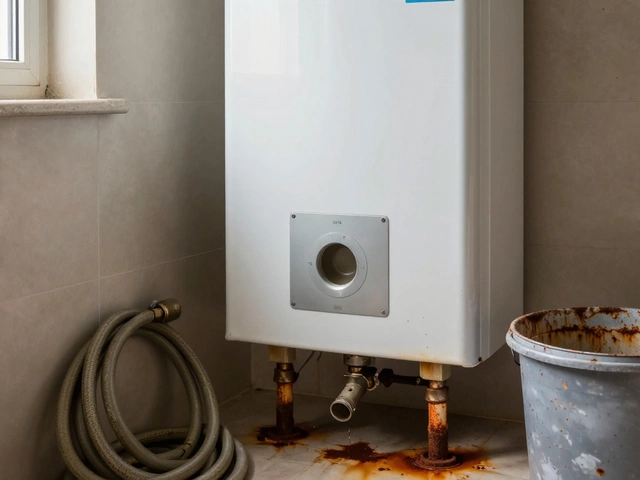Imagine the whirr and churn of your washing machine as the heartbeat of your home, tirelessly ensuring your clothes come out fresh every time. These mighty machines have become indispensable, and knowing how long they can last is both practical and wise for any homeowner.
As with all things, washing machines have a life expectancy. While they don't retire with gold watches, understanding what influences their lifespan can save you time, money, and a few drops of sweat when that laundry pile grows towering high.
In the following sections, we unravel the mystery of the washing machine's lifespan, exploring average life expectancies, common factors affecting their longevity, and tips to help yours keep humming along for many more cycles.
- Average Lifespan of Washing Machines
- Factors Influencing Lifespan
- Common Mistakes That Shorten Lifespan
- Maintenance Tips for Longevity
- Signs It’s Time for a New Washer
- Choosing a Durable Washing Machine
Average Lifespan of Washing Machines
When it comes to understanding how long a washing machine will stand by your side, washing loads and rinsing out those stains, the average timeline becomes quite intriguing. Typically, a washing machine can last anywhere from 10 to 13 years, provided it's given the care it deserves. Now, this isn't just some random guess; it's backed by data from consumer reports and appliance experts. Considering the number of loads a machine handles each year, its lifespan isn't too shabby. During its lifetime, a trusty washer may tackle about 4,000 wash cycles. That sounds impressive, doesn't it? But remember, just like a loaf of bread or a smartphone, every washing machine's journey is unique, impacted by factors like make, model, maintenance, and usage patterns.
Some brands and models might crank it up to 15 years or more, especially if they belong to the realm of high-end machinery. But be wary of assuming these statures come without their quirks. For instance, front-loaders and top-loaders might wear at different paces. While front-loaders are often more efficient, they're also more prone to mold, which can affect longevity if not regularly cleaned. On the flip side, top-loaders, although sometimes deemed less energy-efficient, usually cut you some slack with maintenance. The challenge lies in finding a balance between initial cost, features, and potential lifespan. It's a puzzle of practicality that every buyer has to solve based on their household’s needs.
According to the National Association of Home Builders, "The average lifespan of a washing machine is about 10 years, but some can last up to 15 years depending on maintenance and usage."This wisdom suggests that a commitment to regular maintenance can stretch the washer’s life, like limbs at a morning yoga session. Let's not forget the beauty of evolving technology. Many of today's machines come with smart features that can alert you to potential issues before they spiral out of control, adding precious years to their operation. Investing in a quality machine and treating it with care can make all the difference. Approach your choice like you'd adopt a pet; understand its needs, pamper it now and again, and it could be with you longer than expected, spinning memories along with those daily loads.
Factors Influencing Lifespan
Have you ever stopped to wonder why one washing machine might chug along for years without complaint while another seems to throw in the towel after just a few spins? It's all about the factors that influence the appliance lifespan. These key players can make or break how long your machine sings that reliable swishing tune in your laundry room.
Quality and Brand: First impressions matter but consistent performance is key. Higher-quality machines, often found in well-regarded brands, come with components that endure more rigorous cycles and harsher detergents. Reputation means that these brands invest in technology designed to minimize wear and tear over time.
Usage Patterns: How often and how you use your washing machine influences its longevity. Machines running daily, especially on heavy cycles, will experience wear much faster. It's important to remember that each wash cycle bites a little more into the machine's lifespan, so balance your wash loads carefully.
"Regular maintenance extends lifespan," says John Sharp, a seasoned appliance technician. "Keep your machine balanced and avoid overstuffing."
Maintenance Habits: Regular check-ups for your washing machine can extend its lifespan significantly. This includes simple actions like cleaning lint traps, inspecting hoses for leaks or cracks, and ensuring the machine is level, which helps prevent unnecessary vibrations that can cause internal damage. Just like your car, a little maintenance can prevent a hefty repair bill.
Environmental Factors: Where your washing machine sits can also play a role in its lifespan. Machines located in basements or humid areas might rust faster or suffer damage from moisture. Proper ventilation and ensuring it's placed on a stable surface are precautionary measures that help combat such environments.
Here is a table that illustrates the expected lifespan range based on usage patterns:
| Usage Type | Lifespan (Years) |
|---|---|
| Occasional Use (1-2 times a week) | 15-20 |
| Regular Use (3-5 times a week) | 10-15 |
| Frequent Use (daily) | 8-12 |
Each of these factors plays a role in determining how long a washing machine can keep your clothes fresh and clean. While some elements might be out of your control, adopting a proactive approach towards maintenance and usage can tip the balance in favor of a longer-lasting appliance.

Common Mistakes That Shorten Lifespan
When it comes to ensuring the longevity of your washing machine, avoiding common mistakes can make a significant difference. Many homeowners unknowingly engage in practices that could be quietly chipping away at their appliance's life. Overloading is one of the most frequent issues. Picture your machine trying to juggle a circus troupe of clothes all at once; that's exactly how it feels when overstuffed. This not only strains your washer but also leads to unbalanced loads that can damage the drum bearings and suspension. Always take the time to follow your wash load capacity guidelines. It might mean an extra cycle now, but it’ll pay off with added years to your machine’s life.
Another oversight is the irregular cleaning of the washing machine itself. Just because it's a cleaner doesn’t mean it stays clean! Residue and lint can build up over time, leading to mold growth and less efficient washes. Simply running an empty hot wash with vinegar or a specialized machine cleaner every few months can thwart such issues. Not many realize that softener trays and filters need attention too. Keeping these parts free of deposits ensures smooth operation, avoiding excess wear and tear.
Using too much or incorrect detergent is a surprisingly common mistake. While it might seem beneficial to add a little extra soap for those heavily soiled loads, excess detergent leaves residues that are hard for the machine to rinse away. This can wear out internal components over time. On the flip side, selecting non-HE detergent for HE machines can result in excessive suds, causing the machine to work overtime and deteriorate faster. As a wise acquaintance, Mark Harris, a longtime appliance technician, once put it,
"Treat your washer like your car—it thrives on the right fuel and regular tune-ups."
Skipping out on professional check-ups or ignoring strange noises is a path leading towards costly repairs and a shortened lifespan. It’s akin to ignoring your car's weird noises until something breaks down. A high-quality washing machine repair service can catch potential problems early, saving money and extending the machine’s usability.
Another often overlooked mistake is failing to balance the washer properly. An unsteady foot can lead to vibrations that shake your machine more than an earthquake jolt, leading to faster wear and, possibly, structural damage. Investing some time in adjusting the machine so it sits even on the ground will help keep those seismic shifts to a minimum.
Developing a habit of these maintenance practices will not only prolong your machine’s life but ensure that each cycle is as efficient as the first. By making a few adjustments to how you care for your washer, you’ll ensure it remains a reliable part of your household for years to come.
Maintenance Tips for Longevity
Keeping your washing machine in peak condition is not just about hitting the right buttons on the control panel. It's more about nurturing this crucial household ally through regular maintenance routines. Think of it like having a trusty car—without oil changes and tune-ups, efficient performance is a mere dream. An invaluable tip is to routinely inspect the hoses. These unassuming rubber or stainless steel tubes carry water in and out, but with time, they can become brittle or develop tiny cracks. Replacing hoses every three to five years ensures they're less likely to burst unexpectedly, which is a nightmare scenario no homeowner wants to face. Just imagine water flooding your laundry room, soaking through walls and floors.
Another golden rule is to be mindful of the detergent amount. Although it’s tempting to think more soap equals cleaner clothes, using excess detergent can create a residue that clogs the diligently working internal components of your machine. Especially with high-efficiency machines, less is more. Detergent manufacturers generally recommend using two tablespoons per load, but always check your user manual for precise guidelines. Accumulated residue doesn't only affect performance; it's also a breeding ground for that moldy, musty smell. Last, but certainly not least, is the importance of leveling your machine. An unbalanced washer can ‘walk’ over time, incurring more wear and tear on vital parts than necessary. Taking the extra time to ensure it remains level is critical for ensuring the machine’s ability to run as quietly as the neighbors probably hope it would.
Keep the Exterior Clean and Tidy
While it may seem superficial, maintaining the exterior of your washing machine plays a significant role in its longevity. Dust and dirt can accumulate, leading to blocked vents or clogging filters. Every few weeks, give the exterior a good wipe-down with a damp cloth and a few drops of mild detergent. Keeping the surface clean helps make sure that the accumulation of grime doesn't affect performance. Don't forget about the door seals either—those sneaky bands of rubber can quickly collect soap scum and grime. It's beneficial to give them a good scrub now and then, using a vinegar-water solution to prevent mold and mildew build-up. Much like in kitchen appliances, vinegar is a natural deodorizer and cleans without leaving any chemical residue.
Additional Proactive Measures
Have you ever thought about preventive maintenance? Some smart homeowners like to conduct seasonal check-ups. A bit of tender loving care in summer and winter can go a long way. This might include checking for leaks, inspecting the drum for foreign objects, or even giving the machine an empty wash cycle with hot water and a cup of vinegar. The high temperature and acidity work wonders at cleaning out any lingering germs and build-up that might have nestled themselves inside.
"Proper maintenance today leads to prolonged lifespan and fewer repair costs," shares Samantha Greene, a renowned appliance expert.So, next time you're standing before your trusty washer, consider pampering it a little more. Ultimately, taking these small but consistent steps will help ensure your faithful washing machine stands the test of time, doing its duty load after satisfying load.
What Data Says About Maintenance
Data suggests that over 60% of washing machine malfunctions can be avoided with regular maintenance. Common issues often arise not because the appliances are old, but because they are neglected. Below is a table highlighting the common issues and their percentage occurrence among neglected washing machines:
| Issue | Percentage Occurrence |
|---|---|
| Hose damage | 25% |
| Detergent residue build-up | 20% |
| Unlevel machine wear and tear | 15% |
These numbers speak volumes about the simplicity and effectiveness of regular maintenance. Grab that checklist and not only will you take the best care of your appliance, but you'll ensure every cycle is a smooth, problem-free experience.

Signs It’s Time for a New Washer
When your trusty washing machine starts exhibiting signs of wear and tear, it can feel as though a beloved member of the household is beginning to falter. Perhaps you've noticed some grumblings, curious leaks, or maybe it's just not washing clothes like it used to. These quirks might indicate it's time for your washer's retirement. Listening to these signals closely can save frustration down the line and ensure your laundry keeps moving smoothly.
One of the classic signs that a washing machine is approaching its end is a persistent noise that wasn't there before. Washing machines naturally make some noise, but when a nerve-jangling grind or clatter takes over, it might be beyond a simple fix. Bearings, for instance, are a common culprit behind loud spinning that can rattle your nerves. These parts wear out over time, and replacing them can sometimes cost as much as a new machine. On the other hand, water puddles greeting you each time you do a load suggest a leaky drum or aging seals, which can be both a plumbing nightmare and a sign that a new appliance might be more cost-effective.
An increase in operational inefficiency is another tell-tale sign. If your washer isn't cleaning clothes like it used to, leaving them less fresh no matter how many times you spin, then its performance is declining. As modern washing machines become more energy-efficient, an older model could be guzzling more water and electricity, showing up as unwelcome extra dollars on utility bills. Indeed, Energy Star-rated appliances promise efficiency, and investing in one may prove cheaper, not just on bills, but in reducing the overall ecological footprint.
"Replacing older appliances can cut down utility costs by as much as 30%," says a study by the U.S. Department of Energy. "This provides a compelling case for modernizing home appliances," the report highlights.
The final nudge can be technological advancement. With each passing year, washing machines are innovated with features that not only make laundry less of a chore but offer premium care for your clothes. Built-in sensors that automatically adjust water levels, steam technology for deeper sanitizing, and smart consoles that let you control the cycle from your smartphone—these are just glimpses of what's possible now. If your washing machine feels like a relic from another era, it might be time to let new technology handle the heavy (and gentle) lifting.
It might feel daunting to replace an old faithful washer, but recognizing these signs not only ensures continued operation but might also beautify your space with a shiny new centerpiece in your laundry room. Before you buy, consider these signals. They speak more than the machine’s age, they sing the tune of efficiency and innovation awaiting to step through your doors.
Choosing a Durable Washing Machine
The quest for a durable washing machine is akin to finding a reliable companion for your daily chores. The market is flooded with models of varying price points, features, and claims of longevity. However, selecting one that truly lasts involves a keen understanding of specific features and build quality. Initially, homeowners should evaluate the machine's capacity and drum material. Drums made of stainless steel often outlive plastic drums and are designed to withstand the rigors of thousands of washes. Stainless steel not only promises resilience but minimizes wear and tear, thus extending the longevity of your beloved appliance.
Additionally, it's crucial to weigh the technological advancements offered by the machine. Contemporary smart washers boast sophisticated sensors and eco-friendly modes, which, when used correctly, can prolong the machine's lifespan by optimizing each wash cycle's efficacy. Models that include inverter motors are noted for their energy efficiency and reduced vibration, which suppresses wear on internal components, contributing to a longer machine life. For those inclined towards state-of-the-art innovations, these features not only indicate a machine's prowess but often align with enhanced durability.
One cannot overlook the significance of consumer reviews and independent testing results. Many reputable organizations routinely assess product durability, offering insights into which machines withstand the test of time. As per a report by Consumer Reports, "Opting for a washing machine with high marks in durability tests is prudent for long-term satisfaction."
Consider heeding advice from such evaluations as they often separate passing trends from truly enduring appliances.
Examining the warranty and service terms offered by manufacturers is equally vital. Reliable brands that extend a comprehensive warranty often have more confidence in their machine’s longevity, providing covers on key parts like motors and drums for up to ten years. This points to superior manufacturing standards and the company’s commitment to quality assurance. Cross-referencing these warranties with customer testimonials can provide a clearer picture of what to expect over the years.
For those who appreciate a good balance between cost and quality, setting a budget frame can be helpful. It's not always the premium models that serve the longest; often mid-range washers can exceed expectations if constructed with sturdy materials and sound design. While the initial investment might be steep, a washing machine that lasts 10 to 15 years will prove worthwhile in saving repair costs and providing peace of mind. Labeling trusted brands with historical precedence in appliance durability can further streamline this decision.
In essence, the art of selecting a durable washing machine merges thoughtful research with intuitive buying strategies. By focusing on material quality, technological advancements, consumer feedback, and company reputation, homeowners are better poised to make informed choices. These decisions resonate beyond just laundry days, shaping household dynamics and ensuring that every spin and rinse cycle is as reliable as the last.





